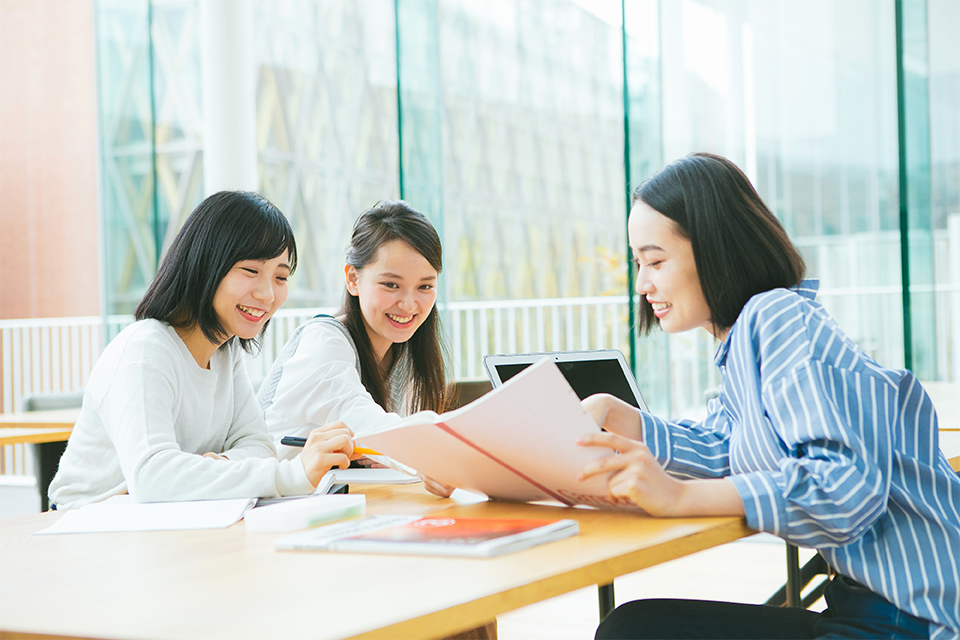Our modern world is replete with problems that spread beyond the boundaries of nations. International conflicts, ethnic struggles, violation of basic human rights, poverty, terrorism, and environmental issues are constant a reality of our life. In the Department of Global Studies, we raise students with global knowledge and sensibility who can work as professionals in a global society.
The department puts special emphasis on language learning. We have more than adequate courses on English which is our first foreign language. For the second foreign languages, we provide Korean, Chinese, French, German, and Spanish courses. We especially emphasize Korean and Chinese because there are many students who seek to study in those two countries.
The best way to obtain global sensibility is to have cross-cultural experiences. (a) We have strong oversea study programs which enable students to study abroad. (b) We have a course called “Cross-cultural Experience” in which students are exposed to the culture, society, history, and current affairs of Asian countries. (c) The Global Studies Study Tour is held in English speaking countries to brush up communicative skills in English language.
One of our characteristics is a good balance of academics and practical skills. The former refers to a rich variety of courses on global economy, global politics, world religions, art, thoughts, including those on Japan. The latter refers to business skills and manners. We want to prepare students to be a well-rounded person who can make an impact in the global world.
Our Philosophy/Policy
Education and Research Purpose
The Department of Global Studies aims to foster human resources, based on the Christian doctrine of love that is our education philosophy, who seek knowledge and understanding of the histories, cultures and people in various countries and regions and can contribute to the establishment of a peaceful and international co-existence society.
Three Study Courses
At the end of the freshman year, students must choose one of the Study Courses (SC). Each SC has its own set of required courses.

English Intensive SC
A course specialized in the acquisition of English language as well as knowledge on English speaking countries and cultures.

Global Cultures SC
A course that emphasizes the study of East Asian languages and cultures, (i.e.) Korean and Chinese.

Co-existence SC
Sociological analysis of global issues, seeking a society in which people can coexist as global citizens.
Features of the Department
- Many oversea partners and many opportunities to study abroad.
- Understanding Asia through “Cross-cultural experience.”
- An oversea experience is required to all students. Financial aid is available.
- Experiential learnings such as Business Internship, NPO/NGO Internship, Japanese language Internship.
- Language Cafe in which students can brush up command of foreign languages.
We have agreements with partners around the world, and many students spend a year oversea.
- Benedictine College (Kansas, U.S.A.)
- University of California, Riverside, Extension Center
- Valencia College (Florida, U.S.A.)
- Victoria University, Extension Center (Victoria, Canada)
- University of New South Wales, Extension (Sydney, Australia)
- St. Paul University, (Manila, Philippines)
- St. Paul University, (Iloilo, Philippines)
- St. Paul University, (Dumaguete, Philippines)
- Bukyong University, (Busan, Korea)
- Catholic University of Korea (Seoul, Korea)
- Shanxi University (Taiyuan, China)
- Business College of Shanxi University (Taiyuan, China)
- Providence University (Taichung, Taiwan)
- Kainan University (Taoyuan, Taiwan)
Disney World Internship
Sophomores and above are eligible to apply for the five-month internship program at Disney World in Florida. They will be working with interns from all over the world, living in the Disney dormitory. Only two institutions hold the right to apply for this program in Tohoku and Hokkaido.
On-campus lectures by ANA Airlines
Sendai Shirayuri Women’s has concluded a College educational partnership agreement with ANA Business Solutions Co. Ltd., which offers on-campus lectures, “ANA Airline School” to students. Active CAs in the ANA Airline School carry out lectures related to hospitality, business manners, and job hunting based on the syllabus. Furthermore, practice, discussion, and presentations have been added, to support the numerous classes that are offered. In addition to the on-campus classes, training at an airport is also conducted for comprehensive studies. This college educational partnership agreement with ANA Business Solutions Co. Ltd. is the first such attempt in the Tohoku and Hokkaido districts.
Policy for admission of new students
(1) Students sought by the Department of Global Studies
- We seek students who are interested in diverse cultures and languages, people, etc. and contribute to the establishment of a peaceful and international co-existence society as citizens of a global society.
- We seek students who wish to provide leadership and play active roles in a global society.
- We seek students who wish to study in order to acquire a wide range of knowledge and practical skills that are useful in society in a balanced manner and with enthusiasm.
- We seek students who can express themselves and at the same time respect the opinions of others.
(2)High school study requirements (learning goals in high school)
- To thoroughly acquire basic academic abilities in major subjects, especially, English and social studies, in high school
- To improve expressiveness in Japanese and practice reading and writing on a daily basis
Policy on organizing and implementing curricula
In order to achieve the Diploma Policy of the Department of Global Studies, the curriculum will organically link common undergraduate courses with specialized courses that provide students with an understanding of the structure of international society, the activities of people living in harmony under diverse cultures, and information and knowledge of the contemporary global world.
A systematic curriculum that extends the three study courses ("English Intensive," "Global Culture," and "Inclusive Society") of the department.
Universal knowledge and education
■Content
In order to deepen understanding and consideration of various social issues in today's global society toward the realization of a multiculturally convivial society, we offer courses to acquire basic knowledge using social science methods and courses based on independent study through research and practical learning (mainly in the Inclusive Society study course).
■Method
Active learning will be combined as appropriate according to the lecture/exercise class format.
■Evaluation
The level of achievement in lecture and seminar subjects will be evaluated by written examinations (including quizzes), reports, participation, etc., in a multidimensional and comprehensive manner in line with the learning objectives. In addition, participation in activities outside of class will be evaluated based on records of participation, content of presentations, etc.
Generic knowledge and skills
■Content
To ensure the cultivation of practical skills that will enable students to play an active role in a global society, courses related to information and business, courses related to the Japanese language teacher training program, and courses related to the acquisition of travel industry qualifications are offered.
■Method
Active learning will be combined as appropriate according to the lecture/exercise class format.
■Evaluation
The level of achievement in lecture and seminar subjects will be evaluated by written examinations (including quizzes), reports, participation, etc., in a multidimensional and comprehensive manner in line with the learning objectives. In addition, participation in activities outside of class will be evaluated based on records of participation, content of presentations, etc.
Specialized knowledge and skills
■Content
To improve students' English communication skills, a specialized subject, “English Basic” will be offered.
Courses to improve English communication skills, courses on English education for children, and courses on the history and culture of English-speaking countries (mainly English Intensive SC). Courses to improve students' ability to use and communicate in Chinese and Korean, as well as courses to study the history and culture of Japan and other Asian countries (mainly in the Global Culture SC).
■Method
Active learning will be combined as appropriate according to the lecture/exercise class format.
■Evaluation
The level of achievement in lecture and seminar subjects will be evaluated by written examinations (including quizzes), reports, participation, etc., in a multidimensional and comprehensive manner in line with the learning objectives. In addition, participation in activities outside of class will be evaluated based on records of participation, content of presentations, etc.
Integrated learning experiences and creative thinking skills
■Content
In the second year, students take the Basic Seminar in Global Studies to acquire basic university learning methods.
In the third year, there will be a Comprehensive Seminar in Global Studies I and II, and in the fourth year, a Comprehensive Seminar in Global Studies III and IV, and a graduation research project in order to deeply study research themes and methods in specialized fields. Practical training courses, such as cross-cultural experiences, are offered in order to explore global society through participation in international exchanges at home and abroad.
■Method
Active learning will be combined as appropriate according to the class format of lectures, exercises or practical training.
■Evaluation
The level of achievement in lecture, seminar, and practical training subjects will be evaluated by written examinations (including quizzes), reports, and participation in the class, in a multidimensional and comprehensive manner in line with the learning objectives. In addition, activities outside of class will be evaluated based on participation records and the content of presentations.
Policy on Graduation Approval and Degree Conferment
DP1: Universal Knowledge and Education
Students shall have the necessary expertise to understand complicated structures, systems, and diverse cultural phenomena in a global society and be highly educated.
- Broad education about global society.
- Broad education about various problems in modern society.
DP2: Generic Knowledge and Skills
Students shall have the ability to express themselves in Japanese and possess basic information processing skills necessary to play an active role in the global age. They should also understand basic knowledge about careers and approaches to them.
- Literacy and communication skills in Japanese.
- Information processing skills.
- Knowledge for career formation.
DP3: Specialized Knowledge and Skills
Students shall have proficiency and practical communication skills in English and other foreign languages. They should also understand the cultural backgrounds that fostered these languages and their historical significance.
- Literacy and communication skills in foreign languages.
- Acquisition of specialized knowledge about English-speaking countries and East Asian culture and history.
DP4: Integrative Learning Experiences and the Ability to Think Creatively
Students shall have the ability to objectively judge matters, understand the global society in its entirety, and make decisions.
- Ability to objectively judge matters.
- Understanding of global society in its entirety.
- Decision-making ability.
DP5:Attitude/Intentionality
Students shall have the ability to act based on an international perspective and actively contribute to the development of a global society.
- Ability to act based on an international perspective.
- Ability to actively contribute to the development of a global society.
- Interest in and understanding of the world.


